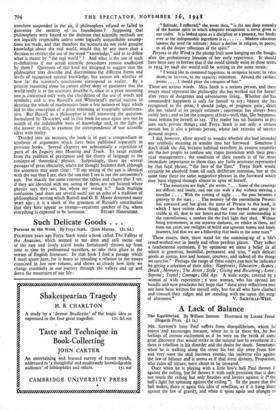Such Delicate Goods . . .
Perseus in the Wind. By Freya Stark. (John Murray. 12s. 6d.)
FOURTEEN years ago Freya Stark wrote a book called The Valleys of the Assassins, which seemed to me then and still seems one of the rare and lovely travel books fortuitously thrown up from time to time by professional travellers, to take their place in the stream of English literature. In that book I find a passage which I must quote here, for it bears so revealing a relation to the essays contained in her new volume, and shows so clearly how little we change essentially in our journey through the valleys and up and down the mountains of our life:
"Solitude, I reflected," she wrote then, "is the one deep necessity of the human spirit to which adequate recognition is never given in our codes. It is looked upon as a discipline or a penance, but hardly ever as the indispensable ingredient it is Modern education ignores the need for solitude: hence a decline in religion, in poetry, in all the deeper reflections of the spirit."
Perseus in the Wind is the plump fruit now hanging on the boughs after the probationary blossom of her early experience. It should have been easy to foresee that if she could already write in those terms in 1934, by 1948 she would still be writing in the same strain:
"I would like to command happiness; to recognise beauty; to value death; to increase, to my capacity, enjoyment. Around the cardinal points .... I should place the conquest of fear."
Those are serious words. Miss Stark is a serious person, and these essays must represent the philosophy she has worked out for herself after years of dangerous and adventurous living. Whether she has commanded happiness is only for herself to say ; beauty she has recognised to the point, I should judge, of poignant pain ; death she has valued at its proper estimate • enjoyment has always been richly hers ; and as for the conquest of far—well, that, like happiness, must remain for herself to say. The reader has no business to pry into such private things ; and Freya Stark is not only a serious person but is also a private person, whose last recesses of secrecy demand respect.
I did, however, allow myself to wonder whether she had intended any symbolic meaning to wander into her foreword. Somehow I don't think she did, because habitual travellers in eastern countries are the last people to confuse any vague mysticism with their prac- tical managements ; the condition of their camels is of far more immediate importance to them than any facile nonsense represented by that fatal phrase, "the lure of the East." Freya Stark would certainly be absolved from all such deliberate intention, but at the same time there are some suggestive phrases in the foreword which may have slipped through almost in spite of herself.
"The mountains are high," she writes. " . Some of the crossings are difficult and lonely, and one can walk a day without meeting a traveller . . . . With the coming of night . . . the pass becomes a gateway to the stars . . . The memory (of the constellation Perseus) has remained and has given the name of Perseus to this book, in which I have written about things that are beyond our grasp yet visible to all, dear to our hearts and far from our understanding as the constellations; a comfort for the frail light they shed. Without being astronomers, in our separate darkness, we rejoice in them, and from our caves, our twilights of belief and ignorant names and lonely journeys, feel that we are a fellowship that looks to the same stars."
These essays, then, must stand for the summing-up of a life's creed worked out in lonely and often perilous places. They reflect a fundamental optimism, if by optimism we mean a belief in all which is generous, beautiful, permanent and true, "such delicate goods as justice, love and honour, courtesy, and indeed all the things we care for." Perhaps the range of these essays can best be indicated by giving a selection of their titles: Happiness ; Education ; Beauty ; Death ; Memory ; The Artist ; Style ; Giving and Receiving ; Love ; Sorrow; Travel ; Courage ; Old Age. A wide scope, covered by a woman of wide experience ; a wise woman, who has opened her bundle and now proclaims her hope that "these stray reflections may not have been written for myself only, but for all who have climbed and crossed their ridges and are standing with me upon the verge




































 Previous page
Previous page